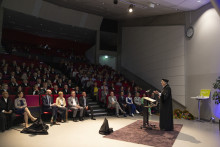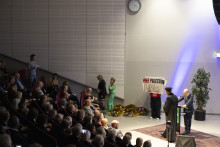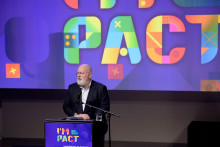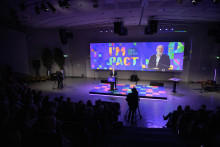A three-quarters full Waaier 1 listened to the Gaudeamus igitur of the students of College Cnødde, the cortège of professors entered the hall accompanied by the beadles and rector Tom Veldkamp welcomed everyone. Jan Hendrik Dronkers, Secretary-General at the Ministry of Infrastructure and Water Management, then gave the keynote lecture on the theme of the day: the circular economy.
That is as far as traditional ingredients go for every UT birthday party. Because before Dronkers could properly start his story, two pro-Palestine protesters interrupted his lecture, an action that rector Tom Veldkamp nipped in the bud.
Wizard and prophet
The common thread in Dronkers' story was the book The Wizard and the Prophet by writer Charles C. Mann. ‘The wizard is the techno-optimist – someone who firmly believes in man's ingenuity to change the current system. The prophet wants to find solutions within the existing system.'
But before Dronkers could get much further, unrest flared up again from the audience. Two more pro-Palestinian protesters interrupted the secretary-general's speech. It led to an apology from rector Tom Veldkamp to the hundred attendees present. ‘This is not a respectful way to have this discussion. To be honest, I feel offended and see no reason to have further talks with this action group.'
(Text continues below the photo.)

At the end of his speech, Dronkers raised the question: do we need sorcerers or prophets to meet the great challenges of our time? His answer: both. 'To make circularity the norm, we need both systemic change and innovation. Individually, neither the sorcerer nor the prophet is right. But together, they can overcome problems. Not by judging each other, but by challenging each other, keeping each other on their toes, letting the facts speak for themselves and giving space to the unexpected. That is also the academic spirit on which the cooperation agreement between the University of Twente and the Ministry of Infrastructure and Water Management is built.'
'Interesting times'
The interruptions of the demonstrators were a sharp contrast to an otherwise modest dies celebration. As rector Veldkamp introduced it in his speech: 'It is a festive day that we celebrate in a sober fashion.' This has everything to do with the current financial and political circumstances, he introduced on the basis of an old Chinese curse: 'May you live in interesting times'.
Because these are certainly 'interesting times' for the UT, according to the rector. He mentioned not only wars, climate change and polarisation, but also society's trust in universities, the changed political climate and the financial challenges for the UT. 'I don't know what the consequences will look like for us. But all these developments are going to have their consequences.'
That is why he expressed a message of hope, to place the university at the centre of society as a so-called fourth-generation university with impact. 'We can also look at the Chinese curse in a positive way. We are an entrepreneurial university, we are engineers. Let us consider these interesting times as an opportunity. Let us live in hopeful times.’
Three prizes
During the UT's 62nd dies natalis, three prizes were awarded: the Marina van Damme Scholarship, the Professor de Winter Prize and the Overijssel PhD Award.
The winner of the Overijssel PhD Award, a cash prize of 5000 euros, was Meike Nauta, who previously won the Young eScientist Award. She obtained her PhD laude in 2023 in the field of Explainable Artificial Intelligence. Nauta now works as a data scientist and AI consultant at Datacation in Eindhoven. Former EEMCS dean Joost Kok called her dissertation 'a roadmap for research into AI with a clear human touch.' Deputy Erwin Hoogland presented the prize on behalf of the Province of Overijssel.
The Professor De Winter Prize went to Mariana Belgiu, associate professor at the ITC Department of Earth Observation Science. The 'publication prize for female top talent' comes with a prize of 2500 euros.
The Marina van Damme grant, 9000 euros and a work of art, went to Shira van Lohuizen. She studied Applied Communication, Science and Human Resource Development at the UT. The jury chose Van Lohuizen because of 'her clear vision of modern leadership, which is necessary for the various transitions'. This year, the jury did not award a grant to a runner-up: six of the nine candidates were immediately eliminated because the submissions did not meet the criteria.
In previous years, the Brinksma Innovation Grant was also awarded during the Dies Natalis, but this year it will be awarded during the Week of Education, from 10 to 14 June. The same applies to the Senior Teaching Qualification certificates and the Central Education Award.






